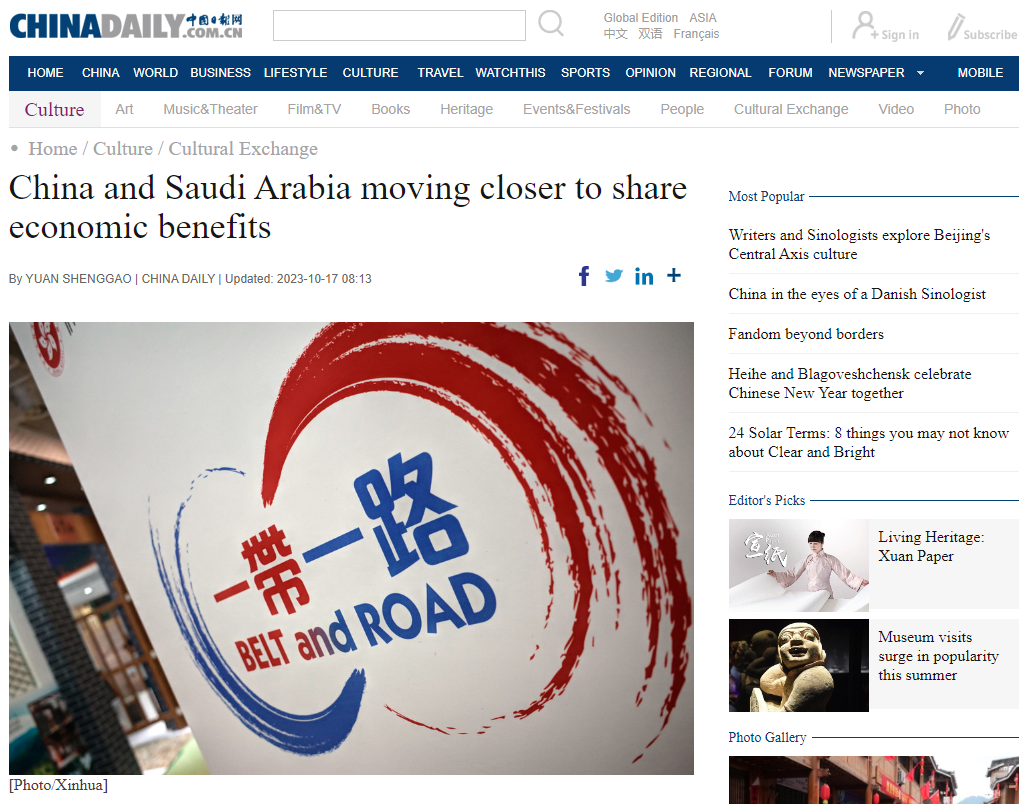LATEST INSIGHTS
Your Present Location: LATEST INSIGHTSWang Wen: China and Saudi Arabia moving closer to share economic benefits
Source: CD Published: 2023-10-17

Trade and economic cooperation between China and Saudi Arabia will see strong growth momentum in the years ahead, driven by the alignment of economic interests and concerted efforts to enhance synergy between the Belt and Road Initiative and Saudi Vision 2030, said analysts and company executives.
Saudi Vision 2030 represents a transformative economic and social reform agenda that is opening up Saudi Arabia to global opportunities. It is also fostering improved communication and coordination between China and Saudi Arabia on regional and international matters.
While the core of China-Saudi Arabia business relations has historically revolved around the oil trade, Saudi Arabia's ambitions to modernize its infrastructure, services and manufacturing capabilities — including projects related to roads; airports; oil tankers; new energy initiatives; offshore engineering equipment and container ports — have created new avenues for Chinese project contractors and manufacturers, said Wang Wen, executive dean of the Chongyang Institute for Financial Studies at Renmin University of China.
Moreover, Wang said that Saudi companies are keen to explore third-party markets in collaboration with China. They aim to strengthen commercial ties with various countries and regions through increased cooperation under the BRI.
"China has been action-oriented in advancing a global community with a shared future, and its major actions include co-building the BRI and further implementing the Global Development Initiative, Global Security Initiative and Global Civilization Initiative," he added.
Thanks to their complementary trade structure and closer economic ties, China-Saudi Arabia trade soared 33.1 percent year-on-year to $116.04 billion in 2022, data from China's General Administration of Customs showed.
China mainly ships construction machinery, vessels, manufacturing equipment, steel, textiles, furniture, computers, smartphones, garments and household appliances to Saudi Arabia. Chinese-made electric passenger vehicles have also become popular in the country.
In addition to crude oil, petrochemicals, fertilizer and other products, Saudi Arabia exports to China include a variety of goods such as metallic ore, aquatic products, marble, olive oil, sesame and dairy products.
The potential for trade cooperation between China and countries involved in the BRI is being continually unleashed, serving as a new engine propelling China's development of foreign trade and outbound direct investment, especially in areas such as 5G, autonomous driving, the production of new energy vehicles and smart city development, said Sun Fuquan, vice-president of the Chinese Academy of Science and Technology for Development in Beijing.
These technologies are developing quickly and reaching maturity in China, he said, noting China's technology solutions and related service projects will help contribute greatly to Saudi Arabia's industrial powerhouse ambitions and supply chain development.
Eager to expand its market presence in the Middle Eastern country, Chinese photovoltaic manufacturing enterprise GCL Technology Holdings announced in early September that the company is in advanced talks with Saudi Arabia about opening its first overseas factory.
The company, the world's second-largest manufacturer of polysilicon, a key component in solar panels, said it is looking to build a plant in the Middle Eastern nation that would produce 120,000 metric tons of green hydrogen per year.
The project will kick off as early as 2025, said the company's Joint CEO Lan Tianshi. Saudi Arabia has mature infrastructure and experience in manufacturing, while the country's abundant sunlight could support its transition from being an oil giant to a solar energy producer, he said.
Riyadh Air, the newly established national carrier of Saudi Arabia, plans to begin operations in 2025, with direct flights to Chinese cities launching in early 2026. The airline is bullish on growing business and leisure travel demand between China and Saudi Arabia.
The airline, which was set up earlier this year, said after it goes into operation, it plans to launch direct flights connecting Riyadh and key Chinese cities — first Beijing, then Shanghai, Guangzhou in Guangdong province, Chengdu in Sichuan province and other cities over time.
"There is a big demand for business connectivity between China and Saudi Arabia. We have also seen huge leisure travel demand as people have curiosity about Saudi Arabia," said Tony Douglas, CEO of Riyadh Air.























































































 京公网安备 11010802037854号
京公网安备 11010802037854号





